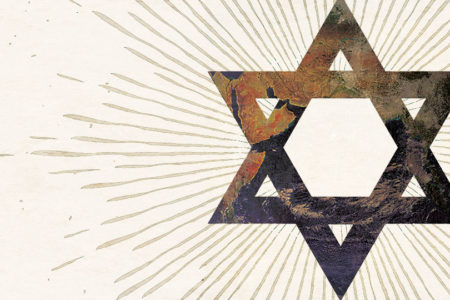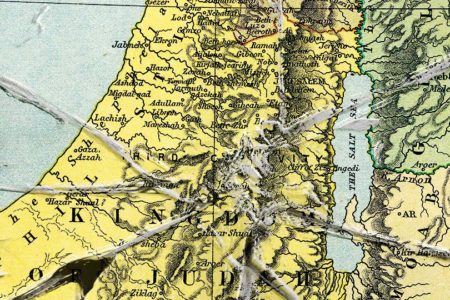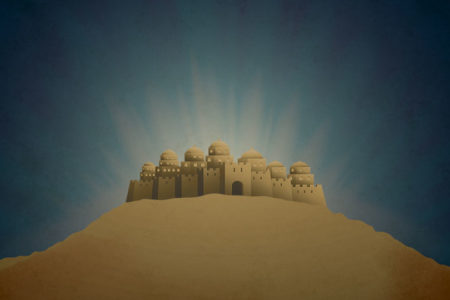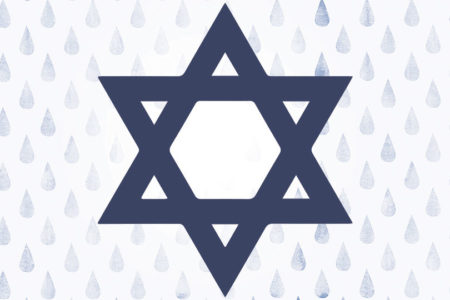The Reason for Hope Micah 4
Why the Jewish nation can still trust in God despite its circumstances
The prophet Micah’s message of doom must have troubled Judah’s leaders. After all, if Judah were destroyed, how would God fulfill the vows He made to the children of Israel in the Abrahamic and Davidic Covenants?
In Micah 4, God gives His people hope and assures them He has not forgotten His promises to their forefathers. And though Judah will be destroyed, He will redeem a remnant and reestablish the Jewish nation in its Promised Land when the Messiah returns to rule the world from David’s throne.
Renewal Promised
Micah 4:1 uses the phrase the latter days, referring to when the Jewish people will suffer great tribulation, followed by the Messiah’s return to rescue them, restore the nation, and establish Jerusalem as the center of His divine rule on Earth. Moses had prophesied this tribulation and restoration before Israel entered Canaan (Dt. 4:25–31). Micah’s prophecy includes six predictions affecting Israel:
1. Elevation
“The mountain of the Lᴏʀᴅ’s house shall be established on the top of the mountains, and shall be exalted above the hills” (Mic. 4:1). The mountains surrounding Jerusalem are higher than Mount Moriah, where the Temple stood. At Christ’s return, they will be flattened; and Jerusalem and the Temple will become elevated above the surrounding area (Zech. 14:4).
2. Adoration
Israel and the world will worship God in Jerusalem: “The peoples will stream to it. Many nations will come and say, ‘Come, and let us go up to the mountain of the Lᴏʀᴅ and to the house of the God of Jacob’” (Mic. 4:1–2, NASB). During the Millennial Kingdom, all roads will lead to Israel, as people the world over encourage one another to go up to Jerusalem to worship at the Millennial Temple.
3.Edification
The Lord will teach saved Gentiles at the Temple: “‘He will teach us His ways, and we shall walk in His paths.’ For out of Zion the law shall go forth, and the word of the Lᴏʀᴅ from Jerusalem” (v. 2). God will teach a new generation how to live righteously and keep His commandments.
4. Arbitration
Nations will bring their disputes to Jerusalem for the Lord to arbitrate:
And He will judge between many peoples and render decisions for mighty, distant nations. Then they will hammer their swords into plowshares and their spears into pruning hooks; nation will not lift up sword against nation, and never again will they train for war (v. 3, NASB).
The Lord will settle all disputes and eliminate war. Nations will turn their weapons into farm implements and cease teaching their people the strategies of battle.
5. Conciliation
With the elimination of war, this difficult, grasping world will finally know true peace. Nations will live in safety and security: “Everyone shall sit under his vine and under his fig tree, and no one shall make them afraid” (v. 4).
During King Solomon’s reign, the words vine and fig tree were associated with peace, plenty, and prosperity (1 Ki. 4:25). The same will be true during the Millennial Kingdom because “the mouth of the Lᴏʀᴅ of hosts has spoken” (Mic. 4:4). No one will fear terrorism or aggression because the Almighty, the omnipotent head of the armies of heaven, has guaranteed peace.
6.Purification
Idolatry will be gone: “For all people [will (literally, “now”)] walk each in the name of his god, but we will walk in the name of the Lᴏʀᴅ our God forever and ever” (v. 5). In Micah’s day, all heathen nations ordered their lifestyles and religious beliefs after false gods. But a godly remnant in Judah walked with the Lord. In the future Kingdom, Judah will put total trust in the Lord, and the world will put away its heathen gods and follow Him as well.
Regathering Predicted
“In that day,” declares the Lᴏʀᴅ, “I will assemble the lame, and gather the outcasts, even those whom I have afflicted. I will make the lame a remnant and the outcasts a strong nation, and the Lᴏʀᴅ will reign over them in Mount Zion from now on and forever” (vv. 6–7, NASB).
The prophet did not say when this prophecy will be fulfilled. The word remnant cannot refer to the Jewish people who returned from the Babylonian Captivity because the Lord did not reign over Judah “forever.” The words in that day must refer to the Millennium, when the Messiah will rule over Israel forever.
The remnant that will be restored is compared to a flock of sheep that were “lame” (footsore), sick, afflicted, and dispersed—a picture of Israel’s condition during the Great Tribulation. When the Messiah returns, this remnant (one-third of the Jewish population, Zech. 13:9) will come to salvation (12:10; Rom. 11:26).
In keeping with the metaphor of sheep, Micah used a circumlocution to express Jerusalem’s elevation when the Messiah returns: “And you, O tower of the flock, the stronghold [Hebrew, ophel] of the daughter of Zion, to you shall it come, even the former dominion shall come, the kingdom of the daughter of Jerusalem” (Mic. 4:8).
The phrase O tower of the flock, the stronghold of the daughter of Zion refers to the southernmost section of the Temple Mount, opposite Zion, separated by the Tyropoeon Valley. The words tower and ophel are used synonymously of the strongholds in the City of David, later fortified by Jotham and Manasseh (2 Chr. 27:3; 33:14). It was where David’s palace once stood and where the king’s men stood as watchmen over the people of Jerusalem. When the Messiah returns to Jerusalem, He will restore the daughter of Zion to her “former dominion” and guarantee Israel protection, peace, political power, and prosperity (Mic. 4:8). The picture is reminiscent of the Davidic and Solomonic empires, which were strong, stable, and impervious to attacks. This prophecy gave hope to a nation that would soon suffer the pain of captivity.
Micah abruptly switched tracks to predict again Judah’s destruction. The prophet asked three rhetorical questions concerning the time of the Babylonian siege: “Now why do you cry aloud? Is there no king in your midst? Has your counselor perished? For pangs have seized you like a woman in labor” (v. 9).
In other words, why did great wailing break out in Judah? Did they not have a king and counselor to call on for help? Yes, but the kings were powerless to lead the nation or counsel it. Jehoiakim and Zedekiah each reigned when Babylon occupied Judah; but both served Nebuchadnezzar, king of Babylon (2 Ki. 24—25).
After Babylon destroyed Judah, the Israelites were left without a king; and they will remain so until their redemption (Hos. 3:4–5). Without leadership, pain and agony will grip them as birth pangs grip women in labor. Although the reference is to the Babylonian Captivity, the situation will be the same during “the time of Jacob’s trouble” (Jer. 30:5–7; Rev. 12), the Great Tribulation:
Be in pain, and labor to bring forth, O daughter of Zion, like a woman in birth pangs. For now you shall go forth from the city, you shall dwell in the field, and to Babylon you shall go. There you shall be delivered; there the Lᴏʀᴅ will redeem you from the hand of your enemies (Mic. 4:10).
Judah’s captivity is pictured in stages. Compelled to leave the city, the people will cry out like a woman in childbirth. On their forced march to Babylon, they will “dwell in the field,” unprotected from the elements and predators. Multitudes will perish. Then a remnant will be held captive in Babylon for 70 years (Jer. 25:11), after which a remnant will be redeemed, or allowed to return, to Judah. This latter prophecy was fulfilled by edict of Persia’s King Cyrus in 538 BC (Ezra 1:2–4).
Micah’s naming of Babylon is an amazing prediction in itself, for it came more than 100 years before all of Judah ended up there (Isa. 39).
Retaliation Pictured
In the future, heathen armies will trample Jerusalem’s holy sites: “Now also many nations have gathered against you, who say, ‘Let her be defiled, and let our eye look upon Zion’” (Mic. 4:11). The world will gloat over Israel’s suffering and subjugation (cf. Dt. 28:37). This prophecy’s ultimate fulfillment will come during the Great Tribulation.
Someday the nations will storm Jerusalem, ignorant of the massacre God has planned for them: “But they do not know the thoughts of the Lᴏʀᴅ, nor do they understand His counsel; for He will gather them like sheaves to the threshing floor” (Mic. 4:12). As sheaves are bundled and brought to the threshing floor to be trodden under the feet of oxen, so the nations that come against Israel will be destroyed.
In verse 13 God directs Jerusalem to arise and trample its enemies as an ox treads out grain with his hoof. A horn of iron and hooves of bronze symbolize the power and strength God will give Israel to fight its enemies. This event likely takes place when the Messiah comes to destroy the Gentile nations at the Battle of Armageddon (Rev. 16:16; 19:19).
Then Israel will gather the wealth of the world and devote it to the Lord, whose power will have accomplished the victory. The phrase to the Lord of the whole earth (Mic. 4:13) refers to the Messiah when He returns as “KING OF KINGS AND LORD OF LORDS” (Rev. 19:16).








